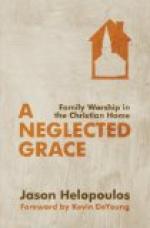By the physical idea of home, we mean, not only its outward, mechanical structure, made up of different parts and members, but that living whole or oneness into which these parts are bound up. Hence it is not merely adventitious,—a corporation of individual interests, but that organic unity of natural life and interest in which the members are bound up. By the moral idea of home, we mean the union of the moral life and interests of its members. This explodes the infidel systems of Fourierism, Socialism, Mormonism, and “Woman’s Rights.” These forms of Agrarianism destroy the ethical idea and mission of home; for they are not only opposed to revelation and history, but violate the plainest maxims of natural affection.
Love is an essential element of home. Without this we may have the form of a home, but not its spirit, its beating heart, its true motive power, and its sunshine. The inward stream would he gone, and home would not be the oneness of kindred souls. Home-love is instinctive, and begets all those silken chords, those sweet harmonies, those tender sympathies and endearments which give to the family its magic power. This home-love is the mother of all home delights, yea, of all the love of life. We first draw love from our mother’s breast, and it is love which ministers to our first wants. It flashes from parent to parent, and from parent to child, making-up the sunshine and the loveliness of domestic life. Without it home would have no meaning. It engenders the “home-feeling” and the “home-sickness,” and is the moral net-work of the home-existence and economy. It is stronger than death; it rises superior to adversity, and towers in sublime beauty above the niggardly selfishness of the world. Misfortune cannot suppress it; enmity cannot alienate it; temptation cannot enslave it. It is the guardian angel of the nursery and the sick-bed; it gives an affectionate concord to the partnership of home-life and interest. Circumstances cannot modify it; it ever remains the same, to sweeten existence, to purify the cup of life, to smooth our rugged pathway to the grave, and to melt into moral pliability the brittle nature of man. It is the ministering spirit of home, hovering in soothing caresses over the cradle and the death-beds of the household, and filling up the urn of all its sacred memories.
But home demands not only such love, but ties, tender, strong, and sacred. These bind up the many in the one. They are the fibres of the home-life, and cannot be wrenched without causing the heart to bleed at every pore. Death may dissect them and tear away the objects around which they entwine; and they will still live in the imperishable love which survives. From them proceed mutual devotions and confiding faith. They bind together in one all-expanding unity, the perogatives of the husband, and the subordination of the wife, the authority of the parent and the obedience of the child.
“O, not the smile of other lands,
Though far and wide our feet
may roam,
Can e’er untie the genial bands
That knit our hearts to home!”




